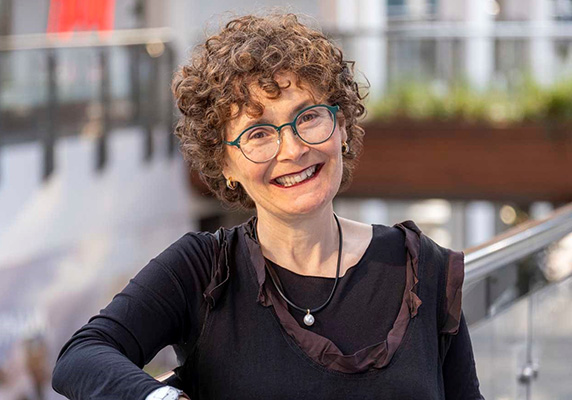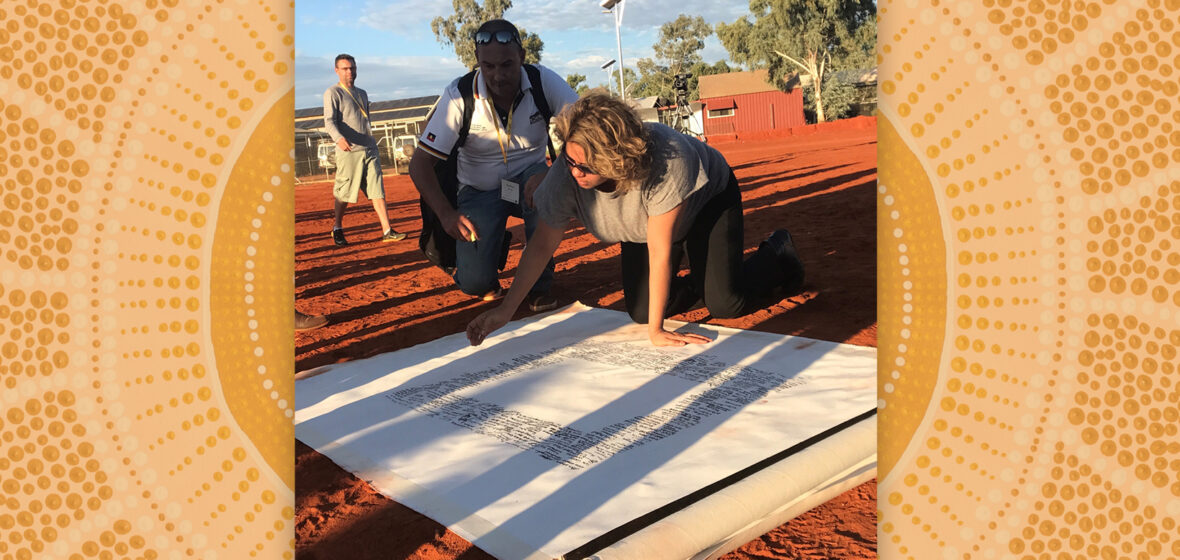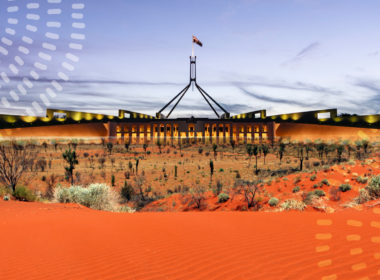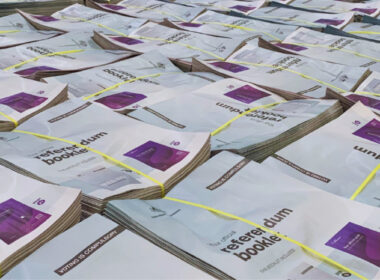Inclusion of the Voice in the Constitution, Professor Kim Rubenstein says, will affirm a commitment to equal citizenship for all and make active citizenship possible for Indigenous Australians
“If I am not for myself, who will be for me, but if I am only for myself, what am I? And if not now, when?”
These words of Jewish spiritual leader Hillel, though more than 2000 years old, are a driving force for Professor Kim Rubenstein, lawyer, academic, author, and human rights advocate. Rubenstein is a Professor in the Faculty of Business, Government and Law at the University of Canberra, and an honorary Professor at the Australian National University. She is an expert in constitutional and citizenship law.
Rubenstein is a champion of active citizenship, the concept she sees embodied in the words of the ancient sage.
“These words speak to me and my drive to be an active citizen and to encourage others to be so as well. How can each of us make the communities in which we live stronger and more inclusive is a question that lives with me always.
“My lengthy Australian heritage – I am a 6th generation Jewish Australian – spared me and my direct family from the Holocaust.
“But I knew that if I had been born in Europe it would have been me and mine, and that realisation profoundly shaped my commitment to the role of law as a means of protecting human rights and promoting social inclusion.”
The equal power of the governors and the governed
For Rubenstein, active citizenship is “a term that draws from a belief in the equal power of the governors and the governed. It is a necessary element of maintaining a democratic society.”

When Australian law moved away from solely recognising British subject status, and introduced the concept of Australian citizenship in 1948, Rubenstein says, this set up a framework for enabling Australians to be active citizens. “It changed the concept of power between the executive branch of government (those governing and making the law) and the people (those subject to the law). Being a citizen, as opposed to being a subject, philosophically and legally represents an equality between those exercising the power and those subject to that power.”
Recognising the “agency of the citizenry”, Rubenstein says, “enables reconciliation with Indigenous Australians to be a meaningful and restorative act [and] one that recalibrates the exercise of power in Australia to benefit all Australians by affirming a commitment to equal citizenship – so that all Australians are active agents.”
A framework for activated citizenship
The Constitution is the instrument that can provide the essential framework for “promoting a more inclusive and activated citizenship”, Rubenstein says. This would be possible if the Constitution is amended “to ensure the current political values and societal membership of Australia are affirmed.”
Rubenstein adds, ‘I’ve been advocating for constitutional change for some time in terms of advocating that the Constitution better reflect the society that it’s governing. The constitution of the 1890s was drafted by white bearded men with no women, no Indigenous Australians, and obviously, through the composition of the society at the time, no multicultural representation.
“The Constitution, as it currently stands, does not reflect those fundamental changes to Australia’s relationship with the Queen, the evolution of a multicultural Australia, and has never represented its connection with Indigenous Australians.
‘The Constitution, as it currently stands, does not reflect the fundamental changes to Australia’s relationship with the Queen and the evolution of a multicultural Australia, and has never represented its connection with Indigenous Australians.’
“Now we have evolved as a society where we’re coming to terms with the structural need for reconciliation. So Indigenous Australians proposals are key for where we are trying to move towards, and then we can promote a multicultural society and we are at a point where the queen of and King of England are no longer relevant to our constitutional structures, even though they have historical links. So I’ve been advocating for some time to change the Constitution to better reflect where we are at as a society. This is because constitutions are foundational to every piece of legislation that flows from them morally.”
For Rubenstein, including the Voice in the Constitution is the first step to making constitutional change that will affirm and facilitate active citizenship for all Australians.
“I see the Uluru Statement from the Heart as fundamental for the health of Australian democracy, a key to achieving a constitution that better reflects the society that it is governing. And I see the Voice as the starting point for this broader project, and fundamentally important as the first constitutional change. If it is successful, which I believe it should be, then it also provides an answer to the naysayers against moving forward on other areas of constitutional change.
“Another important aspect of the Statement from the Heart is that the process for developing the Voice was a very engaged citizenship process: Indigenous leaders went to all communities around the country and engaged Indigenous communities with the Constitution and said, what do you want from your constitution, in terms of recognition? And they didn’t want just a preamble. They wanted something which led to this proposal, and, even though it’s not universally accepted by all Indigenous Australians, a majority of Indigenous Australians who were involved in that very democratic process supported it.”
Rubenstein adds, “that also is actually inspirational to community because it is showing active citizenship on the part of Indigenous Australians in encouraging non-Indigenous Australians to engage with the Constitution. This is something that all Australians should be doing, and they’re leading the way to encourage us to re-engage with our Constitution. This lead should be followed because this is their positive invitation to us to respond in a way that affirms their identification of what would be right and just in our very colonial documents.
“The Voice builds on the active citizenship of Indigenous people coming up with its design, but it also ensures that Indigenous Australians are actively involved in the evolution of not only the Constitution but also of the law, the legislative framework. This means that the people who are affected by the laws are actually actively involved in the sense of providing direct feedback to our Parliament.”
‘The Voice builds on the active citizenship of Indigenous people coming up with its design, but it also ensures that Indigenous Australians are actively involved in the evolution of not only the Constitution but also of the law, the legislative framework.’
LSJ asked Rubenstein to share her thoughts on the proposed wording about the Voice in the Constitution, and the referendum question that will ask Australian people to consider the inclusion of this wording. Here is the wording, agreed on at 23 March 2023, which will write a new chapter into the Constitution:
“Chapter IX Recognition of Aboriginal and Torres Strait Islander Peoples
129 Aboriginal and Torres Strait Islander Voice
In recognition of Aboriginal and Torres Strait Islander peoples as the First Peoples of Australia:
-
- There shall be a body, to be called the Aboriginal and Torres Strait Islander Voice;
- The Aboriginal and Torres Strait Islander Voice may make representations to the Parliament and the Executive Government of the Commonwealth on matters relating to Aboriginal and Torres Strait Islander peoples;
- The Parliament shall, subject to this Constitution, have power to make laws with respect to matters relating to the Aboriginal and Torres Strait Islander Voice, including its composition, functions, powers and procedures.”
The referendum question will ask:
“A Proposed Law: to alter the Constitution to recognise the First Peoples of Australia by establishing an Aboriginal and Torres Strait Islander Voice.
Do you approve this proposed alteration?”
Rubenstein says of the agreed wording to be included in the Constitution, “The Indigenous community who developed the Voice have been involved in advising on this for many years now. They’ve been very thorough in ensuring that there has been real input from constitutional lawyers in a way that is respectful of the separation of powers and our current structural framework. The body will not be vetoing legislation, it’s really a very democratic expression, a very clear one, of recognising Indigenous Australians.
“The identification of the change and the specific wording are not elaborate, nor should they be. They should really just set up the concept, which then becomes embedded and protected, which is what, essentially, the wording is doing.
“And then the specific detail will become a parliamentary process.”
Rubenstein has been teaching about the Constitution for three decades – since 1993. “I’ve been engaged with it as an academic and then my citizenship work has engaged me directly in it in terms of the impact of the Constitution on citizenship matters. In my teaching of it to students and in my thinking and writing about it, I just see how fundamental it is to everybody’s day-to-day lives. I’ve become passionate about it, knowing just how fundamental it is. Every piece of legislation that governs us is ultimately having to be framed through a constitutional lens.
Rubenstein encourages those contemplating entering the field of constitutional law to follow their interest.
“Modern constitutions are foundational to everything that plays out in our society. They provide a legal frame for promoting and affirming national identity and contributing to a socially cohesive society. If you’re interested in the relationship between the individual and the state, which everybody’s affected by, then working in the field of constitutional law becomes a very real way of playing out that interest.”




